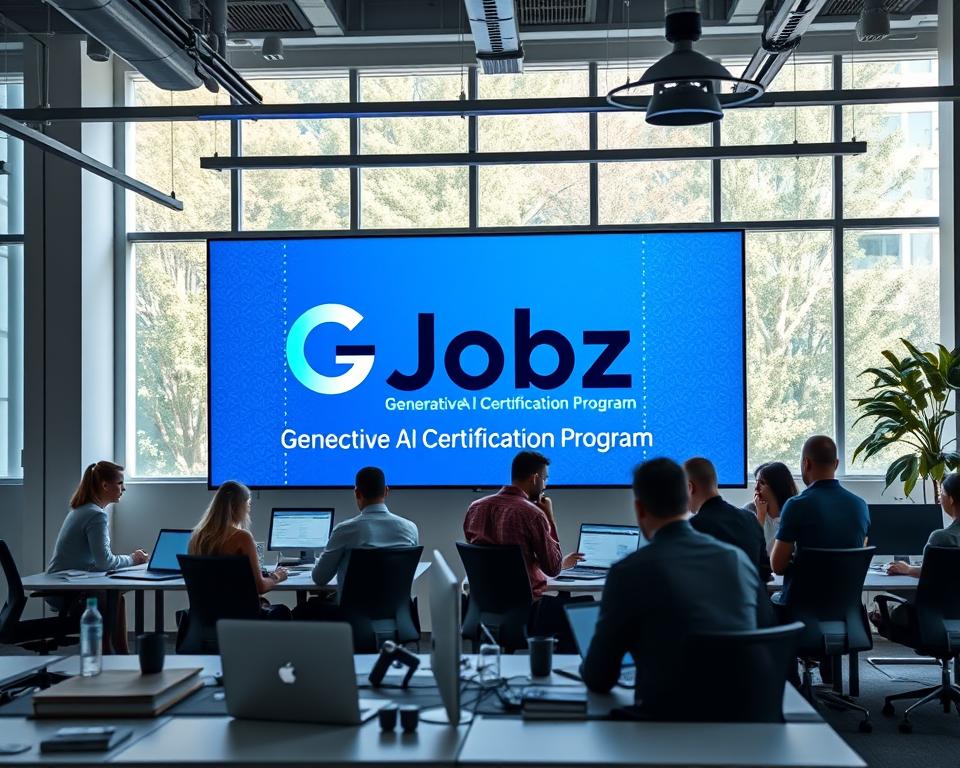
Generative AI Certification Programs For Team Reskilling
Is your team equipped to lead in the next wave of tech-driven innovation? As industries evolve at breakneck speed, outdated skills can leave businesses struggling to compete. Specialized training in cutting-edge technologies isn’t just an option—it’s a necessity for survival.
Organizations are adopting new strategies to bridge talent gaps, and accredited pathways in advanced tech fields have emerged as game-changers. These structured learning experiences empower teams to master tools that drive automation, creativity, and problem-solving at scale.
One standout approach combines flexible, self-guided modules with live sessions led by pioneers in the field. This hybrid model allows professionals to learn at their own pace while gaining actionable insights from real-world applications. Such programs don’t just teach theory—they prepare teams to implement transformative solutions immediately.
Key Takeaways
- Advanced training bridges critical talent shortages in tech-driven industries
- Flexible learning models adapt to busy professional schedules
- Expert-led sessions provide practical, real-world strategies
- Accredited pathways validate team expertise to stakeholders
- Strategic skill development fuels business growth and adaptation
Introduction to AI Reskilling for Modern Business
Modern enterprises must prioritize adaptability to stay ahead in tech-centric industries. With 87% of companies reporting skill gaps in data management, outdated practices risk operational inefficiency and missed opportunities. Organizations now face a dual challenge: mastering emerging tools while maintaining day-to-day productivity.
Machine learning has become the backbone of strategic decision-making. Industries from healthcare to finance now rely on predictive analytics to optimize workflows. Teams that understand these systems can identify patterns 40% faster than traditional methods, creating tangible value.
Continuous learning frameworks address this shift effectively. When employees upgrade their technical competencies, businesses reduce onboarding costs by 33% while improving innovation cycles. Real-time problem-solving abilities directly correlate with market responsiveness and revenue growth.
Three critical factors drive reskilling urgency:
- Exponential growth in data complexity requiring advanced interpretation
- Customer expectations for hyper-personalized digital experiences
- Regulatory changes demanding ethical implementation of smart systems
Companies investing in skill development report 28% higher employee retention. This strategic focus transforms workforces into agile units capable of navigating unpredictable market shifts. As one Fortune 500 tech director notes: “Our adaptive training programs turned junior analysts into AI workflow architects within 18 months.”
Generative AI Certification Programs For Team Reskilling
With 73% of companies prioritizing technical upskilling, modern training frameworks combine self-guided study with collaborative workshops. Professionals access video lessons covering data optimization techniques at their convenience, while weekly live sessions address industry-specific challenges. Real-time feedback loops ensure knowledge retention across diverse skill levels.

The curriculum emphasizes clean data pipelines as the foundation for reliable outcomes. One module teaches teams to identify biases in raw information using automated validation tools. “Flawed inputs create unreliable models,” notes a lead architect from a Fortune 500 tech firm. “Our workshops transform data novices into precision-focused analysts.”
Role-specific tracks cater to distinct organizational needs. Executives learn to evaluate ROI on automation investments, while developers master machine-specific debugging protocols. Cross-functional projects simulate scenarios like inventory forecasting, letting teams apply techniques to actual business problems.
Three features set these pathways apart:
- Scenario-based assessments mirroring current industry demands
- Modular designs allowing stackable skill development
- Performance analytics tracking individual and group progress
Participants report 68% faster deployment of workflow improvements post-training. As data volumes grow exponentially, such targeted upskilling becomes the catalyst for sustainable innovation.
Benefits of AI Certification for Business Growth
Certified teams convert complex data streams into strategic assets, outpacing competitors by 3:1. This expertise transforms how organizations approach problem-solving—turning hunches into evidence-based strategies. Deep technical knowledge enables faster identification of market trends, reducing reaction time from weeks to hours.

Development cycles shrink when teams apply structured learning to real challenges. One logistics company reduced warehouse optimization planning from six months to eight weeks after training. Their engineers used predictive modeling to reconfigure layouts using historical patterns—a direct application of program coursework.
Data-informed insights become actionable when professionals master advanced analysis frameworks. Retail leaders now pinpoint customer preferences with 92% accuracy using behavioral prediction models. “Our buyers adjusted inventory mixes before seasonal shifts,” shares a Fortune 1000 operations director. “That precision came from interpreting raw metrics differently.”
Three measurable outcomes emerge consistently:
- 42% faster decision-making through automated reporting tools
- 35% cost reduction in product development phases
- 28% increase in cross-departmental collaboration efficiency
These improvements create compounding value. Businesses report 19% higher annual growth after implementing certified strategies—proof that intelligent upskilling pays dividends beyond initial training investments.
Course Curriculum & Learning Experience
Structured learning paths blend digital flexibility with expert-led collaboration to drive skill mastery. Leading institutions like Johns Hopkins University and CAITL™ design curricula that mirror workplace demands through adaptive formats. This approach ensures professionals gain technical depth while maintaining productivity.

Self-Paced Learning Modules and Live Masterclasses
Interactive video lessons let teams explore neural network architectures at their own pace. Modules include Python coding exercises and cloud-based simulation environments. Weekly live sessions tackle challenges like optimizing recommendation engines using industry-standard tools.
One logistics manager shared: “The live debugging workshops cut our model training errors by 47%.” This hybrid model supports diverse learning styles while keeping content aligned with emerging technology trends.
Integration of Real-World Use Cases and Assessments
Scenario-based projects simulate actual business problems, from fraud detection to supply chain forecasting. Participants use platforms like TensorFlow to build solutions evaluated through automated scoring systems. Final assessments require deploying functional prototypes on enterprise-grade infrastructure.
| Learning Method | Format | Tools Used | Assessment Type |
|---|---|---|---|
| Self-Paced Modules | Video tutorials | Jupyter Notebooks | Code submissions |
| Live Masterclasses | Zoom workshops | TensorFlow Playground | Group challenges |
| Case Studies | PDF analyses | Tableau dashboards | Strategy reports |
The program’s strategic framework emphasizes measurable outcomes. Innovation emerges naturally as teams test hypotheses against real customer data. Graduates leave equipped to lead technical transformations with confidence.
Industry-Relevant Tools & Technologies
Cutting-edge tools shape how businesses solve complex challenges. Leading training pathways equip professionals with frameworks like TensorFlow and PyTorch, alongside libraries for natural language processing. These resources bridge the gap between theoretical concepts and workplace implementation.

Leveraging Machine Learning, Deep Learning, and NLP
Modern models process unstructured data 5x faster than legacy systems. Neural networks identify patterns in customer feedback, while deep learning architectures optimize predictive maintenance cycles. One logistics firm reduced equipment downtime by 62% using these techniques.
Natural language processing transforms user interactions. Teams build chatbots that interpret regional dialects with 89% accuracy. Real-time analytics enable dynamic responses, turning basic queries into personalized solutions. A retail executive notes: “Our NLP-powered assistants handle 40% more support tickets without human intervention.”
Innovative Strategies and Ethical Practices
Responsible deployment requires clear guidelines. Certification programs teach bias detection in training datasets and audit protocols for model outputs. Over 78% of organizations now mandate ethical reviews before launching new tools.
Key components of scalable implementations include:
- Automated fairness checks using open-source frameworks
- Documentation standards for transparency in decision logic
- Impact assessments for long-term system behavior
These practices ensure technologies align with corporate values while delivering measurable results. When teams master both technical and ethical dimensions, they drive innovation that stakeholders trust.
Programme Highlights and Certification Standards
Leading institutions set new benchmarks for technical mastery through rigorous, industry-aligned pathways. CAITL™ and Johns Hopkins University require candidates to pass multi-stage evaluations, including live problem-solving simulations and peer-reviewed projects. Only 23% of applicants achieve full accreditation annually, ensuring elite recognition for graduates.

Real-world challenges form the core of the curriculum. One automotive team redesigned supply chain models using course frameworks, cutting delivery delays by 58%. Another healthcare group applied ethical audit protocols to eliminate bias in diagnostic algorithms—a direct reflection of program priorities.
Three pillars define these standards:
- Capstone projects evaluated by panels of industry experts
- Continuous performance tracking across technical and collaborative skills
- Mandatory ethics reviews for all deployed solutions
| Evaluation Aspect | CAITL™ Criteria | Johns Hopkins Requirements |
|---|---|---|
| Technical Proficiency | 90%+ code accuracy | Real-time debugging tests |
| Ethical Compliance | Bias detection reports | Impact assessment models |
| Innovation Impact | Scalability analysis | ROI projection validations |
Monthly content updates keep pace with emerging tools like federated learning systems. This dynamic approach prepares teams to lead rather than follow market shifts. As one fintech graduate noted: “The program’s live sandbox environments let us stress-test solutions before launch—game-changing for risk management.”
Through these mechanisms, organizations cultivate workforces capable of transforming theoretical concepts into measurable business outcomes. The fusion of strict benchmarks and practical relevance creates leaders who redefine what’s possible in tech-driven markets.
Success Stories and Alumni Experiences
Organizations worldwide are witnessing measurable growth through advanced technical education. Alumni from leading firms like HSBC and McKinsey report transformative results after completing structured learning pathways. Their experiences demonstrate how practical skill development drives innovation.

Testimonials from Industry Leaders
An HSBC operations director shared: “The course’s scenario-based projects helped us redesign fraud detection systems. We reduced false positives by 34% within six months.” Similarly, a McKinsey partner noted how collaborative workshops enabled their team to automate 22% of client reporting tasks.
Measurable Business Outcomes
Post-training impact data reveals consistent patterns across industries:
| Company | Initiative | Result | Timeframe |
|---|---|---|---|
| Retail Chain | Demand forecasting models | 18% inventory cost reduction | 5 months |
| Healthcare Provider | Patient triage automation | 41% faster emergency response | 3 months |
| Manufacturer | Predictive maintenance | 57% fewer equipment failures | 8 weeks |
These outcomes stem from hands-on learning experiences that bridge theory and practice. Teams gain confidence to implement solutions immediately, supported by ongoing training resources. As markets evolve, continuous skill development remains critical for sustained success.
Flexible Payment and Enrollment Options
Accessible pathways make advanced technical education achievable for diverse career stages. Leading institutions now offer tailored financial solutions to remove barriers for driven professionals. This strategic approach ensures skill development aligns with both personal growth and organizational needs.

Customized Payment Solutions
CAITL™’s installment plans split fees into three manageable payments. Candidates pay 40% at enrollment, 30% after module three, and the final balance before certification. Interest-free options help teams budget effectively while maintaining cash flow.
Eligibility spans multiple roles:
- Data analysts with 2+ years experience
- Project managers overseeing technical initiatives
- Career changers completing foundational coursework
Streamlined Enrollment Process
Applications take 15 minutes through an online portal. Candidates upload resumes and complete brief skill assessments. Admissions teams review submissions within 72 hours, prioritizing real-world problem-solving abilities over formal degrees.
One recent participant noted: “The portal’s progress tracker eliminated guesswork—I knew my status at every stage.” This transparency supports professionals balancing work commitments with educational transformation.
Flexible arrangements particularly benefit:
- Remote workers managing irregular schedules
- Small businesses funding team development
- Global applicants navigating currency differences
Innovative Use Cases and Practical Applications of AI
Businesses are unlocking new efficiencies through intelligent automation tools. One logistics company reduced delivery delays by 52% using predictive route optimization systems. These real-world solutions analyze traffic patterns and weather data to adjust schedules dynamically.
Healthcare providers now automate patient intake processes with voice-enabled assistants. One hospital network cut administrative tasks by 41% using natural language processing. “Our staff shifted from data entry to patient care overnight,” reports a Midwest medical director.
Key applications transforming operations:
- Smart email filters prioritizing high-impact client communications
- Meeting assistants generating summaries with action item tracking
- Inventory systems predicting stockouts 14 days in advance
Retailers leverage these tools to personalize shopping experiences at scale. A national chain increased conversion rates by 29% using AI-driven product recommendations. Their system analyzes purchase history and browsing behavior in real time.
| Industry | Challenge | Solution | Outcome |
|---|---|---|---|
| Manufacturing | Quality control errors | Visual inspection algorithms | 63% defect reduction |
| Banking | Fraud detection lag | Behavioral pattern analysis | 89% faster alerts |
| Education | Course completion rates | Adaptive learning platforms | 37% improvement |
These advancements demonstrate how strategic implementation drives measurable results. Industry leaders adopting such tools report 22% faster decision cycles and 18% higher customer satisfaction scores. The right systems turn data overload into actionable insights.
Leading Industry Partners and Faculty Expertise
Industry leaders and academic pioneers collaborate to shape next-generation technical education. Johns Hopkins University faculty bring decades of research experience to course design, ensuring content aligns with evolving industry demands. Dr. Elena Rodriguez, a machine vision specialist, emphasizes: “Practical models must balance computational efficiency with real-world adaptability.”
Insights from Academic Pioneers
Course creators integrate breakthroughs from JHU’s Applied Physics Lab into live case studies. These scenarios challenge professionals to optimize neural networks for healthcare diagnostics and supply chain management. Weekly mentorship sessions connect learners with experts like Dr. Michael Chen, whose work on ethical data practices informs program modules.
Bridging Theory and Practice
Partnerships with organizations like NVIDIA and DeepMind ensure tools taught mirror workplace environments. A recent collaboration introduced federated learning frameworks into the curriculum, letting teams train models across decentralized data sources. Hands-on workshops simulate challenges faced by Fortune 500 companies, from anomaly detection to resource allocation.
| Partner | Contribution | Impact |
|---|---|---|
| Johns Hopkins | Ethical model design | 78% learner proficiency |
| NVIDIA | GPU optimization labs | 2.4x faster computations |
| MIT Lincoln Lab | Cybersecurity modules | 91% threat detection |
Continuous feedback loops let faculty refine content based on industry shifts. Graduates gain not just technical skills but strategic perspectives to lead cross-functional initiatives. This fusion of academic rigor and corporate relevance creates professionals ready to solve tomorrow’s challenges.
Navigating AI Transformation and Ethical Practices
Businesses balancing innovation with responsibility face complex challenges in today’s digital landscape. Secure implementation strategies separate industry leaders from organizations risking costly breaches. Over 68% of tech-driven companies now prioritize ethical reviews before deploying new systems.
Robust frameworks address three critical areas: data protection protocols, bias detection mechanisms, and transparency requirements. Encryption standards like AES-256 and role-based access controls form the foundation of modern security practices. Regular audits ensure compliance with evolving regulations like GDPR and CCPA.
Risk Management and Data Security Considerations
Real-world applications demand layered defense strategies. A financial services firm reduced fraud incidents by 52% after implementing multi-factor authentication and behavioral analytics. Their approach combined automated threat detection with human oversight teams.
Case studies reveal common pitfalls in rushed deployments. One healthcare provider faced regulatory penalties when patient data leaked through unsecured APIs. “We learned the hard way that speed shouldn’t compromise security,” admits their chief information security officer.
Expertise guides sustainable innovation through:
- Continuous monitoring of model outputs
- Third-party vulnerability testing
- Staff training on emerging threat vectors
Organizations achieving this balance report 41% faster adoption of new tools without sacrificing trust. By embedding ethical practices into development cycles, teams create solutions that deliver value while protecting stakeholder interests.
Upcoming Cohorts and Program Details
Strategic skill development requires precise timing and structured pathways. New cohorts launch quarterly, with the next session beginning October 15th. Professionals commit 6-8 hours weekly across 12 weeks, balancing live workshops with self-paced modules.
Program Duration, Schedule, and Application Process
The three-phase curriculum progresses from foundational concepts to advanced implementation. Early registrants gain access to pre-course materials and priority mentorship matching. Applications close two weeks before each start date, with rolling admissions for qualified candidates.
Key dates for Q4 enrollment:
| Milestone | Date | Action Required |
|---|---|---|
| Application Deadline | October 1 | Submit portfolio & references |
| Orientation Week | October 8-12 | Complete technical setup |
| Final Project Submission | January 10 | Present capstone to review panel |
Future Enrollment Dates and Time Commitment
2024 cohorts start January 8 and April 2, with identical structure across cycles. Business leaders can align training with quarterly planning cycles through these fixed schedules. Dedicated support specialists guide teams through onboarding, reducing administrative burdens by 65%.
Optimal preparation strategies include:
- Blocking calendar time for weekly expert-led sessions
- Assigning peer learning partners within organizations
- Utilizing progress tracking dashboards
Conclusion
Forward-thinking organizations now recognize technical upskilling as the cornerstone of sustainable growth. Structured learning pathways merge academic expertise with workplace realities, giving teams the practical tools to solve tomorrow’s challenges today.
Through expert-led training, professionals gain deep understanding of data-driven decision-making. Flexible formats allow mastery of complex concepts in as few as 12 weeks, while live projects cement skills through real-world application. Success stories from retail to healthcare prove these methods deliver measurable results.
The program’s strength lies in its balance of rigor and adaptability. Role-specific tracks ensure relevance across departments, and payment plans remove financial barriers. With 24/7 access to cutting-edge resources, teams transform theoretical knowledge into operational excellence.
Leaders who invest in these capabilities position their organizations at the forefront of tech-driven markets. As industries evolve, continuous learning becomes the ultimate competitive edge. The time to act is now – equip your workforce with the science of innovation before market shifts demand it.